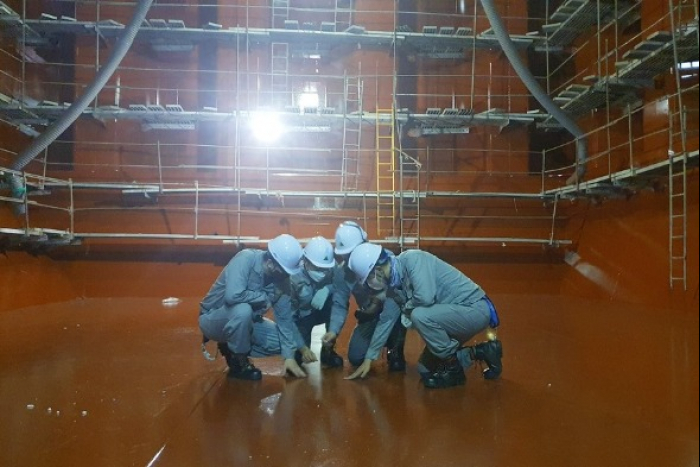Petrochemicals
Hyundai Heavy develops new chemical-resistant paint for PC carriers
The new paint was applied to the petrochemical product carrier built by Hyundai Vietnam Shipbuilding last month
By Dec 21, 2022 (Gmt+09:00)
2
Min read
Most Read
LG Chem to sell water filter business to Glenwood PE for $692 million


Kyobo Life poised to buy Japan’s SBI Group-owned savings bank


KT&G eyes overseas M&A after rejecting activist fund's offer


StockX in merger talks with Naver’s online reseller Kream


Mirae Asset to be named Korea Post’s core real estate fund operator



Hyundai Heavy Industries Group said Wednesday that it has developed a paint product for petrochemical product (PC) carriers with significantly improved chemical resistance and applied it to vessels built by Hyundai Vietnam Shipbuilding for the first time.
Korea Shipbuilding & Offshore Engineering, Hyundai Heavy Industries Co., and Hyundai Mipo Dockyard Co. recently developed the paint in collaboration with Chugoku Marine Paints, a Japanese company specializing in marine paints.
Chemical resistance refers to the degree to which toxic chemicals can be endured, and is a necessary feature for paints for cargo holds of PC ships that carry petrochemical products.
According to Hyundai Heavy Industries, the paint developed this time has improved chemical resistance and increased the number of petrochemical products that can be transported by more than 40%.
In addition, by increasing the solid content, the company reduced volatile organic compounds that cause photochemical smog by more than 70%.
In general, the paint used for the PC ship's cargo hold is a phenolic-based epoxy paint, which has drawbacks in that the types of cargo that can be transported are limited due to its low chemical resistance.
Overseas, paints with improved chemical resistance were developed using resorcinol diglycidyl ether (RDGE), but it is still classified as a hazardous chemical in South Korea.
The paint for the PC ship's cargo holds newly developed by the shipbuilder does not contain carcinogenic substances, thus it can be used without any safety training. After unloading cargo, it has excellent coating film recovery properties and is easy to clean.
Accordingly, in the case of cargoes that easily damage the coating film, such as methanol, the time it takes for re-shipment can be shortened from 30 days to 7 days, greatly improving the ship's operational efficiency.
The ship at Hyundai Vietnam Shipbuilding, which used the paint for the first time, is a 50,000 DWT (net cargo tonnage) class PC ship, which was delivered to the ship owner in November this year.
"As the operational efficiency of PC ships has improved significantly, ship owners' interest has heightened and we expect the demand for PC ships to increase rapidly," said an official of Hyundai Heavy Industries Group.
"We will consistently improve our technology to raise competitiveness," he added.
Write to Ik-Hwan Kim at lovepen@hankyung.com
More to Read
-
 Shipping & ShipbuildingSouth Korea's Hyundai Heavy Industries establishes chief AI officer post
Shipping & ShipbuildingSouth Korea's Hyundai Heavy Industries establishes chief AI officer postDec 06, 2022 (Gmt+09:00)
2 Min read -
 Shipping & ShipbuildingHyundai Heavy Industries Group proposes blueprint for sustainable marine utilization solution at 2023 CES
Shipping & ShipbuildingHyundai Heavy Industries Group proposes blueprint for sustainable marine utilization solution at 2023 CESDec 01, 2022 (Gmt+09:00)
1 Min read -
 Carbon neutralityHyundai Heavy to invest $30 million in TerraPower for SMR business
Carbon neutralityHyundai Heavy to invest $30 million in TerraPower for SMR businessNov 04, 2022 (Gmt+09:00)
2 Min read -
 Shipping & ShipbuildingHyundai Heavy's KSOE expected to turn to black in Q3
Shipping & ShipbuildingHyundai Heavy's KSOE expected to turn to black in Q3Oct 03, 2022 (Gmt+09:00)
2 Min read
Comment 0
LOG IN


